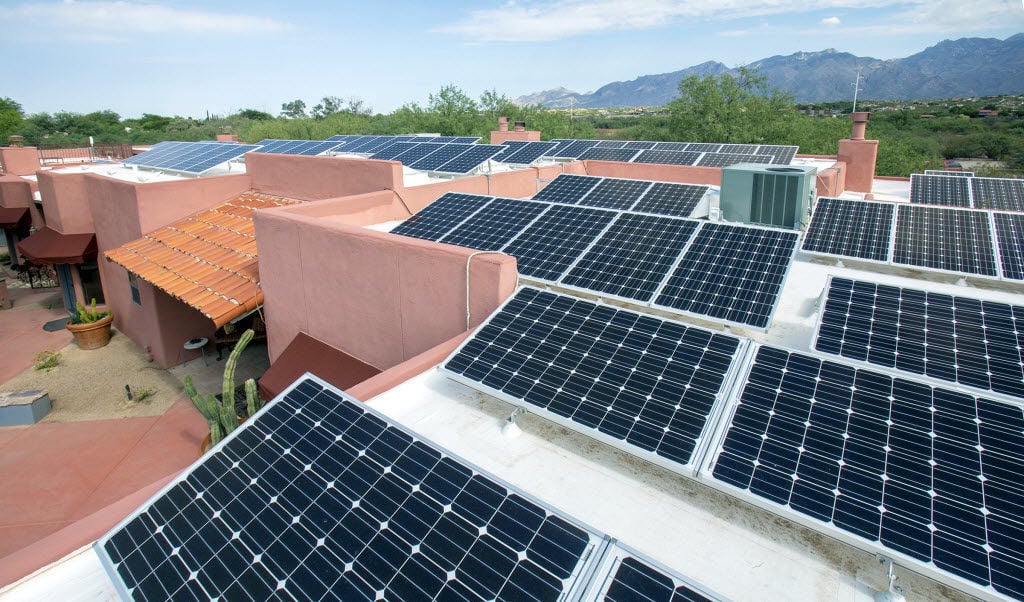A state hearing judge has called for Arizona utility regulators to end so-called net-metering for rooftop solar customers, but not quite yet.
If the Arizona Corporation Commission follows the recommendation, it would mean new solar customers would initially get far less financial credit on their electric bills for the excess power they produce, and that benefit might eventually disappear altogether.
In a filing in the Arizona Corporation Commission’s ongoing examination of the value of rooftop solar, administrative law judge Teena Jibilian said regulators should scrap the current system of reimbursing customers with rooftop solar at the full retail rate for power.
For the near future, Jibilian said, new credit rates for customers with rooftop solar panels should be based on short-term cost studies or on the cost of power from large, utility-scale solar farms.
The recommendation could have far-reaching implications as the commission mulls requests by Tucson Electric Power Co. and other state-regulated utilities to increase charges on solar customers to offset an indicated cost shift to other ratepayers.
In rate cases filed by TEP, Arizona Public Service and rural provider UNS Electric, the commission put off decisions on net-metering changes until the conclusion of a “generic” commission proceeding examining the value of so-called distributed generation — customer-owned rooftop solar.
The commission is expected to decide the valuation matter during an open meeting in late November.
Under Arizona’s current net-metering rules, customers with rooftop solar are credited for the full retail rate for excess energy they produce and export to the grid, and they can carry over, or bank, those credits.
In a new recommended opinion and order, Jibilian said net-metering “should eventually be eliminated and replaced with a mechanism for the direct purchase of excess solar power by utilities.”
In the meantime, Jibilian backed two short-term methods to value rooftop solar, to provide a gradual transition from current rates and to set compensation that reflects “the actual value” of rooftop solar exported to the power grid.
That actual value has been the subject of more than two years of debate at the commission, which has put off deciding net-metering and related rate-design issues until the so-called generic docket on the value of solar concludes.
Jibilian said the valuation of rooftop solar power exports should be based on an avoided-cost methodology — essentially the cost the utility would pay to generate or purchase power from another source.
But parties to the solar-valuation proceeding are pushing very different ideas of what should constitute “avoided costs.”
Utilities including TEP say rooftop solar has only marginal net value beyond the avoided cost of fueling conventional power plants. The utilities add that because rooftop solar customers use far less grid-supplied power, they impose unrecovered fixed costs on the utilities and non-solar customers.
In the solar valuation case, APS and TEP both proposed setting the value of rooftop solar based on adaptations of their own “cost of service” studies.
TEP also proposed an alternative method that would base rooftop solar credits on the cost of the utility’s most recent power purchase agreement for big, grid-scale solar farms.
APS says its initial studies show it should be paying rooftop solar customers about 3 cents per kilowatt-hour for excess power exported to the grid, compared with the full retail rate of more than 12 cents now.
TEP says under its purchased-power proxy rate, it would pay about 6 cents per kWh, compared with a full retail rate of about 11 cents.
But solar industry groups Vote Solar and The Alliance for Solar Choice dispute the notion that rooftop solar adds significant unrecovered fixed costs and say the utilities’ proposals would essentially kill off the state’s residential solar industry.
The advocacy groups say the value of rooftop solar goes far beyond fuel, including lessening the need to construct new power plants and reducing the environmental and health costs associated with burning fossil fuels, and want any solar valuation to look out to benefits over a 20- to 30-year period.
In her recommended order, however, Jibilian advocated that the utility panel approve one of two short-term valuation methods for determining the value of rooftop solar.
One methodology, proposed by the Corporation Commission’s own utility staff, would arrive at avoided costs by considering energy and system losses, system capacity, grid-support services, financial risk and reliability, as well as environmental and social and economic factors.
The other methodology, also proposed by the commission’s staff, would base solar valuation on the costs of utility-owned solar photovoltaic plants and power purchases from third-party solar farms.
But the judge said either method should be based on forecasts over five years — the approximate interval between electric utility rate cases — to avoid including “speculative benefits and costs,” and reviewed in each rate case.
The Residential Utility Consumer Office, a state agency that advocates on behalf of residential ratepayers, proposed a solar valuation that would add a feature offering solar customers 20-year contracts for their excess energy exports.
Rates offered would be “stepped down” as more solar customers sign on and solar costs continue to fall.
Existing rooftop-solar customers would be “grandfathered” at their existing full-credit rates, under current proposals.
Jibilian said that any decisions to grandfather existing rooftop solar customers at their current full reimbursement rate should be made in each rate case.
But she said any new rates should apply only to those customers who sign up for new rooftop solar connections after the effective dates of those rate cases.





